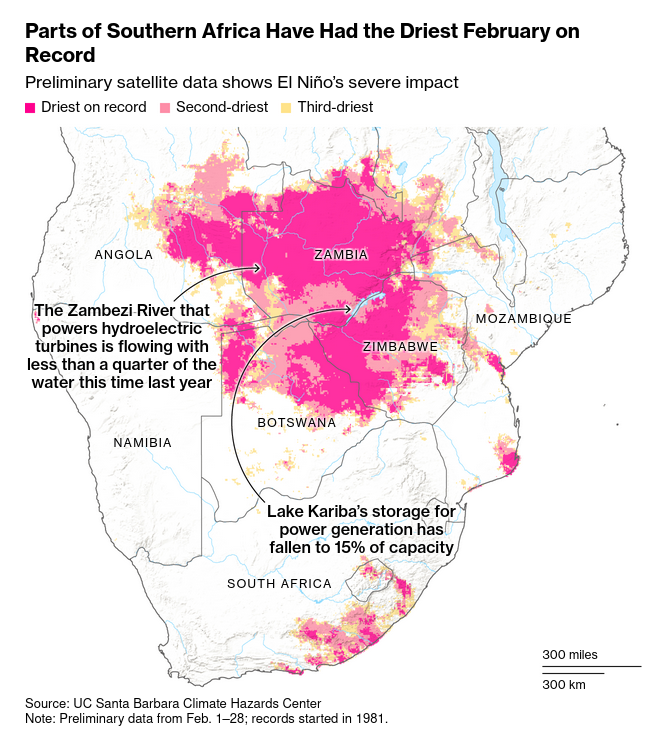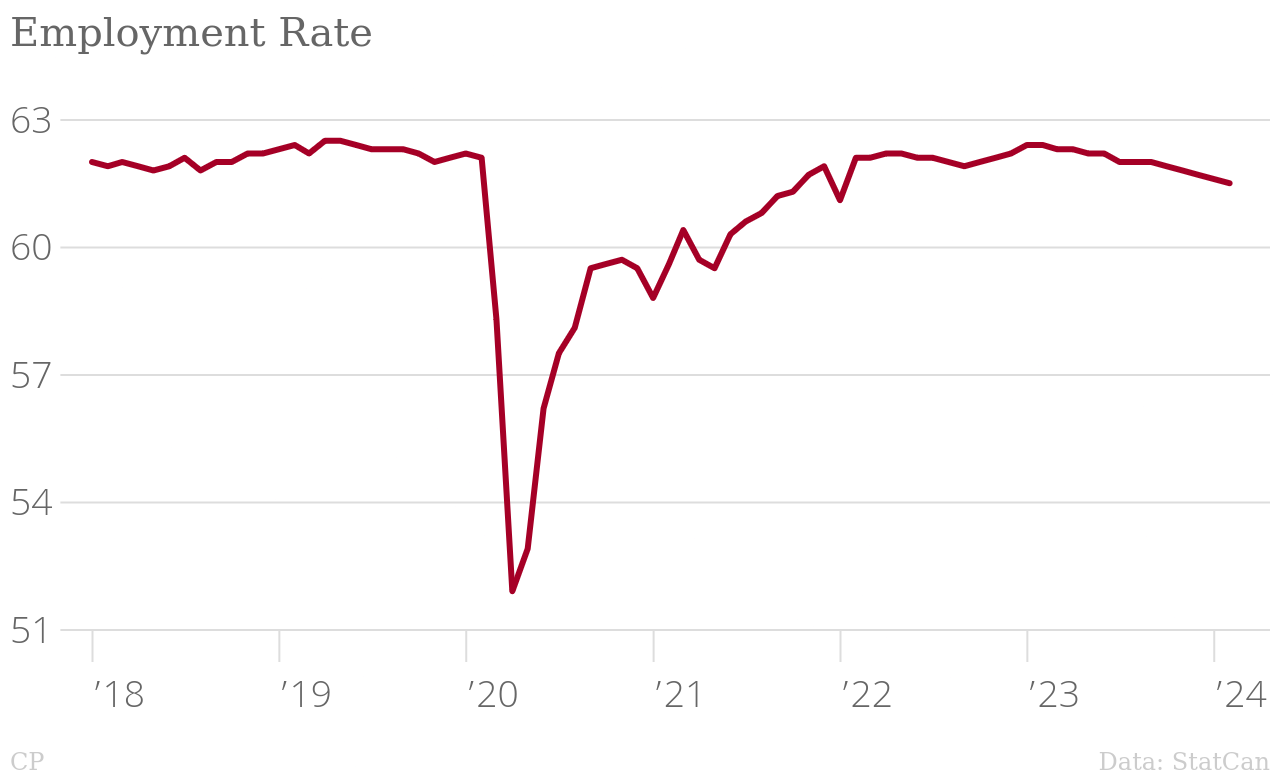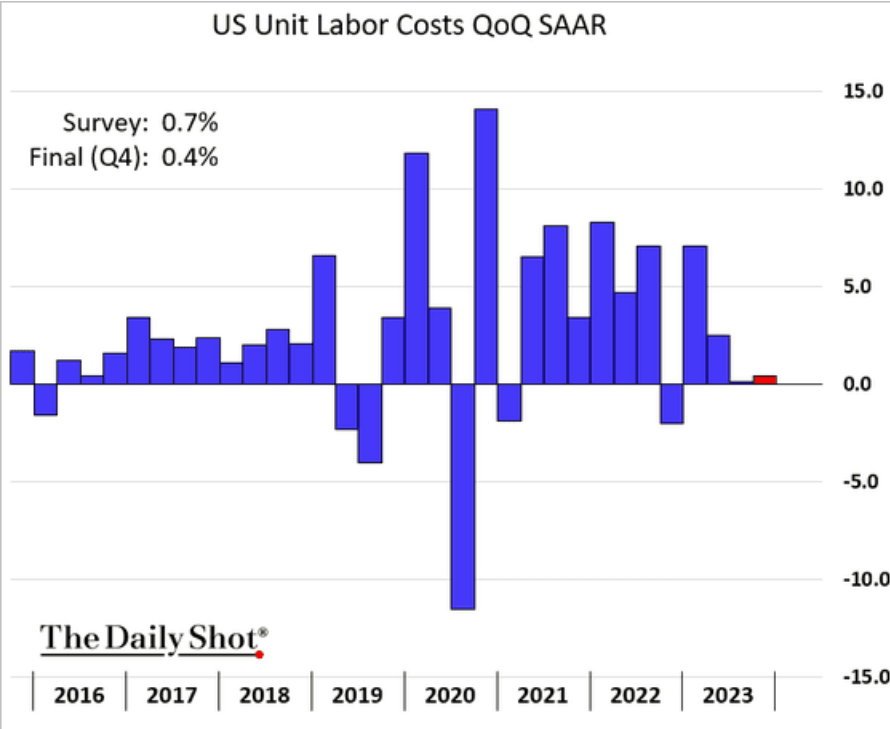March 8, 2024
Warming
In the seas:
- Mass die-offs of farmed fish happening much more frequently
- Bleaching event in the Great Barrier Reef as corals are under heat stress.
Norway says close to 17% of their farmed fish died suddenly in 2023. (BBC)
- 5.05 million fish in Canada are at risk of from just a single mass die-off event. Such an event could drastically affect local community economies and food supplies. If the industry does not reform itself an event like this is inevitable. Of course, the industry knows this and had little to change over the decade of increasingly dire announcements by scientists.
Made worse by the El Niño, climate change continues to warm the seas causing a stability crises for established species.
On land
- Southern Africa has had one of the driest Februaries on Record resulting in hydro electric generation slowdown.
- Crops have been wiped out
These are driving inflation and economic problems:
- Corn prices in Zambia surged 76% in February
Zambia's state power utility will on March 11 start rolling blackouts lasting eight hours daily. It plans to ask mines in Africa's second-biggest copper producer after the Democratic Republic of Congo to cut their power use by as much as 25%. Mines in Congo rely on Zambian power supplies, and face potential shortages too. (Bloomberg)
Zambia's power exports is important to its economy and this is making it difficult to deal with an IMF loan restructuring. Climate change risk was not included in the terms of the loan.

Climate risk
The USA financial regulator Securities and Exchange Commission (SEC) established a rule that will require company disclosures on climate risks.
- the final rule requires thousands of companies to report some greenhouse gas emissions in an attempt to provide investors with more consistent, reliable and comparable climate disclosures. (FT)
- Main opposition: US Chamber of Commerce and the Republicans
SEC had watered-down its rules in the face of reality denying businesses and politicians. But, there will be a long legal battle with many saying the rules will likely never actually be put into force. Good on some folks in the SEC for trying though.
The American control much of the investment rules, but Europe has established some of the strongest reporting rules for companies operating inside its boarders. Reporting on the climates real and expected impact on their business is just good sense. It also makes costing the impacts of climate change a little easier for governments and scientists.
Of course, if Trump wins reality is the last thing to get in the way of reporting on climate since all reporting will likely be scraped.
As regulations flow through the political system on reporting it is worth asking why the opposition is so strong. Could it be that everyone has been lying about their emissions? Yes. That is exactly it.
CN Rail and the right to strike effectively
CN Rail is active at the national and international level opposing the right to bargain, strike, and the right to strike effectively (i.e., blocking the use of scabs).
In the rail sector, they are opposed to right to strike and seem to want to replace right to strike with an interest arbitration scheme.
Their arguments are multi-pronged:
- supply chain disruptions have a role in driving inflation
- rail is essential in the supply chain
- right to strike lengthens strikes (because it provides workers too much bargaining power)
- replacement workers are essential is sustaining supply chains during labour disputes
- Ports should be considered "essential service"
- Interest Arbitration should replace bargaining/right to strike.
CN uses the phrase "protect the continuity of the supply chain" in their opposition to anti-replacement workers. It is also open about these positions and has included this in all submissions to government and comments on anti-scab legislation and port/rail strikes.
This is the case even as ports are explicitly identified under the ILO conventions as not part of a list of essential services.
All of this is an attempt by rail companies to get around specific Constitutional ensured rights to bargain and strike.
I think that the right to strike effectively is the last essential component that will end-up in front of the Supreme Court, which will include replacement workers.
CN Bargaining
CN and other rail companies are currently engaged in bargaining with Teamsters and in conciliation. They are not close and Teamsters is set for strike action.
Unifor is in bargaining in the rail sector through this year with bargaining and a strike vote already taken place at Ontario Northland.
As such, it is likely the current Autoport dispute is also tied into CN's campaign to undermine the right to strike and the use of replacement workers. Replacement workers were ready and trained day one for the Autoport strike.
Here is the background page on the current Autoport bargaining.
ILO right to strike
There is a current action against the International Labour Organization (ILO)'s interpretation of the international ILO convention that protects the freedom of association and its relationship to the right to strike at the International Court of Justice.
The employer association is making the challenge and the International Trade Union Confederation (ITUC) is responding.
The question put to the ICJ by the employer group is:
Is the right to strike of workers and their organizations protected under the Freedom of Association and Protection of the Right to Organise Convention, 1948 (No. 87)?
Canada Employment stats
Not the greatest employment figures for the end of the year in 2023. This matches the not so great GDP numbers that came out almost to the letter. So, nothing unexpected.
Capacity Utilization fell hard in Manufacturing (-0.7%).
Unemployment unchanged, but following a not so great trend.
And employment rate is creeping also not along a great trend.
One might point to the Bank of Canada not reading the tea leaves properly on their decision to leave rates alone. Of course, they are all about making workers pay for inflation, so maybe they are reading them correctly.
_chartbuilder.png)

We are seeing similar numbers in the USA this morning, but this is the graph that should give labour union leadership some pause. Our bargaining power seems to have run out of steam a little.

The good news in the Daily Stats:
Global food prices are declining across Wheat, Canola, and Soybeans meaning a slight drag on inflation growth.
The bad news flip side?
Canadian producer prices are declining across Wheat, Canola, and Soybeans meaning less money for farmers even as costs continue to be sustained.
Waste Water Energy
If you did not see the CBC story on wastewater energy, it is an interesting potential program they are reporting on.
Find out how hot your sewage waste water is. The fun is endless.